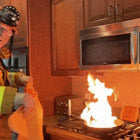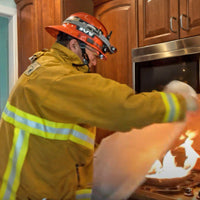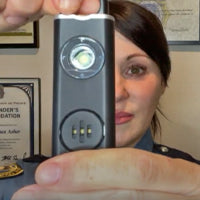Where you put your smoke detectors matters just as much as installing them. Proper placement makes sure they can detect...
The National Fire Protection Association (NFPA) says that about three out of five fire deaths happen in homes with malfunctioning or zero smoke detectors. The same report says 38% of home fire deaths occur in places with no smoke alarms.
Smoke detectors play a huge role in warning you and your loved ones of immediate danger. As much as we want them to last forever, many factors affect their effectiveness. So, how long do smoke detectors last? How do you maintain them? What are the signs your unit needs to be replaced? Let's find out below.
How Smoke Detectors Work

There are two main types of smoke detectors: ionization and photoelectric.
Ionization smoke detectors are more responsive to flaming fires. These are fires that produce a lot of flames but with less smoke. They’re usually caused by fire hazards like flammable liquids, grease, wood, or paper. They work by using a tiny amount of radioactive material called americium-241 to charge air particles in their chambers.
When smoke enters, the current gets disrupted and triggers the alarms. Due to this, ionization smoke detectors are sensitive to fires that spread quickly and produce lots of flames but little smoke.
Ionization smoke detectors are usually more affordable than photoelectric ones. However, they’re more prone to false alarms because they’re more sensitive to smoke particles.
On the other hand, photoelectric smoke detectors are more responsive to smoldering fires. These are fires that produce a lot of smoke but less flames. They’re caused by things like upholstered furniture and thick mattresses.
Different types of fire can occur in homes, workplaces, and commercial buildings. So, it’s best to use ionization and photoelectric alarms or combination detectors. You should also have tools like fire blankets, flame shields, fire sprays, and fire extinguishers to put out the fires your smoke alarms detect.
Smoke Detector Maintenance

Maintaining your smoke detectors could mean the difference between a small, manageable fire and a raging inferno. Here’s how to maintain your smoke alarms properly:
1. Test your units once a month.
Smoke detectors come with test buttons, which you need to press once every month. When pressed, the test button should emit a loud, continuous beep. This sound lets you know that everything’s good to go.
Otherwise, something’s wrong. A weak sound might mean the batteries need to be replaced or your smoke alarm has internal problems. Either way, you should get to the root cause and have it fixed right away. Check out why your smoke detector beeps with a new battery here.
You should also set a monthly reminder so you don’t forget to test your smoke alarm. This might seem small, but it’s a habit that can save lives.
2. Clean your smoke detectors.
Dust, debris, and even insects can enter your smoke alarm and cause problems. Cleaning your unit once every four to six months makes sure these particles don’t mess with your alarm.
Clean your unit by turning off the power (if it’s hardwired) and removing it from its mount. Then, use a vacuum with a soft brush attachment to gently go over the vents and outer casing.
Lightly wipe stubborn dust or gunk using a dry microfiber cloth, if any. Don’t spray anything on the unit because moisture can mess with your smoke alarm. Once it’s clean, pop it back in its original position. Make sure it’s secure.
3. Replace the batteries when needed.
Smoke detectors randomly go off in the middle of the night for many reasons. The most common? Low batteries.
If the batteries are the problem, replace them right away. According to the NFPA, smoke alarms with replaceable batteries need new ones at least once a year. A good routine is to change the batteries when daylight saving time starts.
4. Check the expiration date.
Smoke detectors don’t last forever. The manufacturing date is usually found on your unit. Check the said date to see when your unit needs to be replaced. You need a new one if it’s over 10 years old. Remember, replacing an old unit is easier and cheaper than dealing with fire damage restoration later.
How Long Do Smoke Detectors Last?

Smoke detectors can last up to 10 years. However, the exact life expectancy of your smoke detector depends on many factors.
For instance, dust accumulates inside your detector over time. This can wear down its sensors and reduce its sensitivity. So, if a fire occurs, your smoke alarm might not give you enough time to escape.
If your smoke detector keeps beeping after replacing the batteries or fails the recommended monthly test, replace it even if it's less than ten years old. You should also replace all interconnected smoke alarms, even if some are still functional, to make sure everything works.
How Long Smoke Detectors Last Based on Type
Here's how long smoke detectors usually last, depending on the type you have at home. However, you should take note that these are just estimates, and the exact expiration date depends on many factors.
How Long Do Hardwired Smoke Detectors Last?

Hardwired smoke detectors can last up to ten years. They're directly connected to your home's electrical system and often have backup batteries that kick in during power outages. The said batteries usually last one to two years.
One of the main benefits of hardwired detectors is their reliability. They have a consistent power supply, so they can detect smoke even during a power outage. Plus, they're usually interconnected, so when one detector goes off, all detectors in the house go off.
How Long Do Battery-Operated Smoke Detectors Last?
These detectors only rely on batteries for power, making them easier to install. These detectors are ideal for garages, workshops, basements, and sheds.
Battery-operated smoke detectors usually last five to ten years. Many people opt to change the batteries yearly, often during daylight saving time, so they don't forget. We recommend you follow this practice.
How Long Do Combination Smoke Detectors Last?

Smoke detectors with carbon monoxide detectors usually last five to seven years. This is shorter than the lifespan of a regular smoke detector, but this type offers added safety by detecting both smoke and carbon monoxide gas.
In addition, carbon monoxide detectors have shorter lifespans because of their sensors. Follow the manufacturer's guidelines and regularly test combination detectors to make sure they'll work when needed.
How Do I Know If My Smoke Detector Needs Replacing?
You’ll know if your smoke detector needs replacing by looking at its age, color, beeping pattern, and performance.
If your smoke detector is over 10 years old, it’s time for a new one. Look at the manufacturing date on your alarm to know how old it is. Even if it seems fine, older units are unreliable.
Another sign is its color. If your unit is turning yellow, it's likely old. That yellow tint comes from a chemical called bromine, not dirt or dust, and it means the unit’s aging out. Constant beeping is also a red flag. If you’ve already changed the batteries and it still won’t stop chirping, it might be dying.
False alarms are another sign your unit needs to be replaced. Older smoke detectors can be too sensitive and go off for no reason. That’s annoying and dangerous if you start ignoring them. Failing the monthly test is a big deal, too. If it doesn’t beep when you press the button, the smoke alarm can’t do its job anymore.
Replace your smoke detector right away if any of these signs are present. Remember, it’s better to spend a few bucks now rather than thousands in fire damage repairs later.
How Do You Tell If Your Smoke Detector Is Expired?

Check the back or side of your smoke detector to tell if it’s expired. You’ll find its manufacturing date there. Most smoke detectors work for up to 10 years from that date. After that, they need to be replaced, even if they still beep. If it’s yellowing, chirping nonstop, not responding to tests, or going off randomly, it’s done.
Combination smoke and carbon monoxide detectors might expire sooner, usually around seven years. If you’re not sure how old it is or it looks worn out, play it safe and replace it.
How Do You Know If a Smoke Detector Is Going Bad?
Know if a smoke detector is going bad by testing it. Press the test button once a month. The unit should produce a loud beeping sound for as long as the button is pressed. Otherwise, consider replacing your unit or calling a technician to inspect it.
Conclusion
Regular testing and timely replacements are key to protecting your home from fires. Don't wait for that annoying beep to remind you—set a date to check for damages and change the batteries. With proper attention and care, your smoke detectors will be ready to protect you and your loved ones when it matters most.
Do you want reliable, easy-to-use, and affordable tools to put out small fires before they spread? Check out Prepared Hero’s fire prevention tools here, and get up to 51% off on certain items. Stay prepared, hero!


 Fire
Fire Safety
Safety Survival
Survival Protection
Protection New
New
 Fire
Fire Safety
Safety Survival
Survival Protection
Protection New
New












